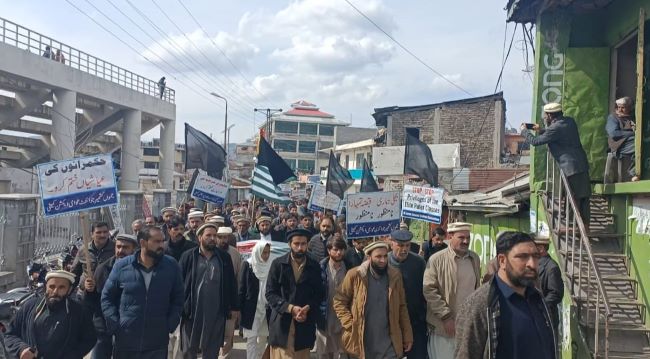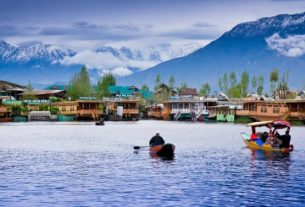The Awami Action Committee now endorses the agenda of taking under the control of the AJK government such projects as make use of the region’s land and water resources.
It almost has the look of an ‘anarchist’ utopia that only a few could fathom right under Islamabad’s nose, but understandably away from the media spotlight. Azad Kashmir (AJK) is witnessing a momentous civil disobedience movement around the boycott of electricity bills. The idea that people do not have to pay for utilities as they have ownership of natural resources has taken root here, and it begs a thorough inquiry as to how this development took place.
In May 2023, in the picturesque town of Rawalakot, the headquarters of district Poonch and the seat of 1947’s armed uprising against Maharaja Hari Singh, a few volunteers started a sit-in against rising flour and electricity prices that quickly gained momentum, followed by a boycott of electricity bills. According to the details released by the electricity department of AJK, around 70 to 80% of users in the successive months boycotted the bills, with some areas touching 93% boycott several times.
One of the demands from the Awami Action Committee is to charge users a minimum of PKR 2.59 per unit, in accordance with the production cost of Mangla. The government has been charging almost five times the production cost
Initially, the movement remained confined to the Poonch division, but with the formation of the Joint Awami Action Committee, it spread to Mirpur and Muzaffarabad as well. A highly unpopular government in AJK that came as a consequence of the region’s majority lawmakers abdicating their loyalties after PTI’s downfall in Pakistan was unable to assuage tempers – and so it failed to counter the popularity of emerging young leaders, particularly Umer Nazir Kashmiri and Shaukat Nawaz Mir, along with scores of others who surpassed the popularity of AJK’s traditional leadership. Initially, the government followed its default carrot-and-stick policy to no avail: it lodged FIRs, and arrested the movement’s leaders, but later released them under public pressure. It has since tried hard to seek Islamabad’s help in breaking the boycott, which has little time and attention for a peripheral problem.
It is both extraordinary and unfortunate that for the last nine months, people in AJK have remained steadfast in their disobedience, causing a great deal of revenue loss to the government, which relies heavily on income from the boycotted sources. It is pertinent to note that before the 13th amendment in the interim constitution of AJK, the government had no rights over hydroelectric power generation, and consequently, projects such as Mangla and Neelum-Jhelum didn’t fall under the jurisdiction of AJK’s government. After the much-awaited 13th Amendment, a feather in the cap of former Prime Minister Raja Farooq Haider, some level of autonomy was restored in AJK, but the this development did not go well with the establishment, and it tried hard to dilute the region’s autonomy every time, resulting in protests across AJK. The Awami Action Committee now pushes along with the agenda of taking such projects under the control of the Azad government that make use of the region’s land and water resources.
AJK produces a mammoth 3,000 megawatts of cheap electricity, whereas the maximum requirement of the region is 400 megawatts. And yet there are long hours of load shedding on top of burdensome bills. Consequently, one of the demands set forth by the leaders of the Awami Action Committee is to charge users a minimum of PKR 2.59 per unit, that is in accordance with the production cost of Mangla. The government has been charging almost five times the production cost, citing reasons such as the use of furnace oil in production – a problem related to independent power producers (IPPs) that has very little to do with power generation and usage in AJK itself.
Surprisingly, instead of understanding the matter in its true spirit, Islamabad Electric and Supply Corporation (IESCO) went to the Supreme Court of Pakistan on the issue of GST application in bills collected from AJK and cited how New Delhi has done the same in Indian Occupied Kashmir. It did not comply with Articles 157 and 161 of Pakistan’s constitution, which bars the government from making a profit out of AJK residents’ pockets through raising the electricity tariff and ensures the priority supply of locally produced electricity to the region. Instead, IESCO maintained the strange position that the electricity produced in AJK is actually ‘exported’ to AJK from Pakistan! The SC, sensing the absurdity of the argument and sensitivity related to the case, refrained from making any judgments and asked IESCO to raise the matter with the federal government – which is yet to wake up from its slumber.
The recent boycott came on the heels of simmering discontent in the region since the 5th of August that shook the morale, trust, and confidence of the Kashmiri people in any policy that Islamabad had for either side of historical Kashmir. It is for this reason that several rounds of negotiations between Muzaffarabad and Islamabad, as well as between the Awami Action Committee and the AJK government, have failed to produce the desired results.
On the other hand, the ongoing movement in AJK has strengthened the region’s resolve for more autonomy in accordance with the mandate given by the United Nations, and the calls to revisit the Karachi Agreement that governs the scheme of relations between Pakistan and the Azad Government of Jammu and Kashmir State have become stronger. Unfortunately, Pakistan’s Kashmir policy is in disarray, and contrary to the past, it now relies heavily on trolls and fake social media accounts, fostering artificial narratives that lack genuineness and depth.
It may seem threatening that people in AJK, to a great degree, have achieved an organisation, capacity, and manoeuvrability that can upset the Kashmir chessboard, but if understood honestly, the situation can help Pakistan in numerous ways. For a while, the people of AJK remained sidelined in Kashmir’s struggle for self-determination, and it increased Pakistan’s role and responsibility that it could not fulfill. Now is an appropriate time for Pakistan to yield some space and autonomy to the people of AJK and work towards building the international recognition of the region.
From the 5th of March, the people led by the Awami Action Committee have hit the roads again, moving one step closer to a final march towards Islamabad. It is high time that the new government understands the gravity of the situation and starts a political process, including the leadership of AJK and Gilgit-Baltistan, focused on settling the issues related to ownership of natural resources, political autonomy and the international recognition of these areas in accordance with the aspirations of local people.__Courtesy The Friday Times Pakistan





